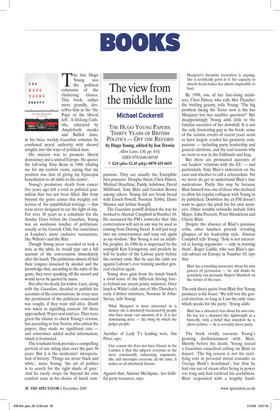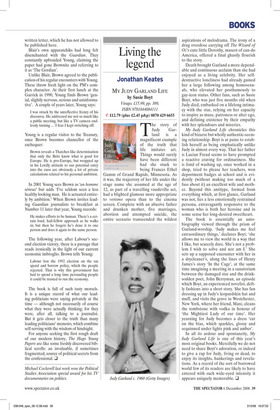The view from the middle lane
Michael Cockerell
THE HUGO YOUNG PAPERS: THIRTY YEARS OF BRITISH POLITICS — OFF THE RECORD by Hugo Young, edited by Ion Trewin Allen Lane, £30, pp. 834, ISBN 9781846140549 ✆ £24 (plus £2.45 p&p) 0870 429 6655 The late Hugo Young was the political columnist of the chattering classes. This book, rather more grandly, describes him as the ‘the Pope of the liberal left’. A lifelong Catholic, educated by Ampleforth monks and Balliol dons, in his twice weekly Guardian columns he combined moral authority with shrewd insights into the ways of political man.
His mission was to promote liberal democracy and a united Europe. He quotes the left-wing Tony Benn in 1986 ‘chiding me for my centrist views, saying that my position was that of giving my Episcopal benediction to all shifts to the centre’.
Young’s premature death from cancer five years ago left a void in political journalism that has not been filled. But from beyond the grave comes this weighty collection of his unpublished writings — that were never designed to see the light of day. For over 30 years as a columnist for the Sunday Times before the Guardian, Young was an assiduous luncher of politicians; usually at his Garrick Club, but sometimes at London’s more exclusive restaurants, like Wilton’s and the Ritz.
Though Young never recorded or took a note at the table, he would type out a full account of the conversation immediately after the lunch. The politicians almost all had their tongues loosened by alcohol and the knowledge that, according to the rules of the game, they were speaking off the record and would never be quoted by name.
But after his death, his widow, Lucy, along with the Guardian, decided to publish his accounts of the conversations. In every case the permission of the politician concerned was sought, if they were still alive. Death was taken as signalling consent. Of those approached, 90 per cent said yes. They were given the chance to check Young’s version, but according to Ion Trewin, who edited the papers, they made no significant cuts — and sometimes added useful information, which is footnoted.
The resultant book provides a compelling portrait of our ruling class over the past 30 years. But it is the moderates’ interpretation of history. ‘Things are never black and white’, notes Young; ‘the art of politics is to search for the right shade of grey.’ And he rarely strays far beyond his own comfort zone in his choice of lunch com panions. They are usually the Europhile bien-pensants: Douglas Hurd, Chris Patten, Michael Heseltine, Paddy Ashdown, David Milliband, Tony Blair and Gordon Brown among others. Young did not break bread with Enoch Powell, Norman Tebbit, Denis Skinner and Arthur Scargill.
The Guardian pontiff defined the way he worked to Alastair Campbell in Number 10. He reassured the PM’s rottweiler that ‘this conversation will not in any way be used as coming from Dowing Street. It will just seep into my consciousness and seep out again as my wisdom.’ But Young is not an infallible prophet. In 1986 he is impressed by the youngish Ken Livingstone and predicts he will be leader of the Labour party before the century ends. But he says the odds are against Labour’s ever winning another general election again.
Young does gain from his lunch bunch a vivid sense of the different driving forces behind our recent prime ministers. Over lunch at White’s club, one of Mrs Thatcher’s early Cabinet ministers, Norman St JohnStevas, tells Young:
What Margaret is most interested in is money: she is absolutely fascinated by people who have made vast amounts of it. It is her dominating drive — the thing by which she judges people.
Another of Lady T’s leading wets, Jim Prior, says:
One reason she does not have friends in the Cabinet is that she subjects everyone to the most emotionally exhausting arguments. She still interrupts everyone all the time: it makes us all absolutely furious.
Against that, Alastair McAlpine, her faithful party treasurer, says:
Margaret’s favourite recreation is arguing. She is terrifically good at it: her capacity to absorb detail makes her almost impossible to beat.
By 1990, one of her fast-rising ministers, Chris Patten, who calls Mrs Thatcher the battling granny, tells Young: ‘The big problem facing the Tories now is the has Margaret lost her marbles question?’ But disappointingly Young adds little to the familiar narrative of her downfall. It is not the only frustrating gap in the book: some of the seismic events of recent years seem to have largely evaded his gustatory companions — including party leadership and general elections, and the real reasons why we went to war in the Falklands and Iraq.
But there are protracted accounts of our leaders’ relations with the EU — and particularly Tony Blair’s indecision on the euro and whether to call a referendum. Yet we never do get to understand Blair’s true motivations. Partly this may be because Blair himself was one of those who declined to allow his regular colloquia with Young to be published. Doubtless the ex-PM doesn’t want to queer the pitch for his own memoirs. Other notable refusniks include John Major, John Prescott, Peter Mandelson and Cherie Blair.
Despite the absence of Blair’s ipsissima verba, other lunchers provide revealing glimpses of his leadership style. Alastair Campbell tells Young: ‘Tony is not interested in having arguments — only in winning them’. Roger Liddle, who was Blair’s special adviser on Europe in Number 10, says that
Blair has a touching innocence about his own powers of persuasion — he still thinks he genuinely can persuade Rupert Murdoch on the virtues of the euro.
The only direct quote from Blair that Young produces is his boast: ‘We will win the general election, so long as I am the only voice which speaks for the party.’ Young adds:
Blair has a distorted view about his own role. He has led a charmed life; lightweight as a butterfly, with a belief that somehow he is above politics — he is certainly above party.
The book vividly recounts Young’s growing disillusionment with Blair. Shortly before his death, Young issued a Guardian encyclical calling on Blair to depart: ‘The big reason is not his terrifying role in personal moral crusades as George Bush’s henchman’, but that he had run out of steam after being in power too long and had outlived his usefulness. Blair responded with a lengthy hand written letter, which he has not allowed to be published here.
Blair’s own apparatchiks had long felt disenchanted with the Guardian. They constantly upbraided Young, claiming the paper had gone Brownite and referring to it as ‘The Gordian’.
Unlike Blair, Brown agreed to the publication of his regular encounters with Young. These throw fresh light on the PM’s complex character. At their first lunch at the Garrick in 1990, Young finds Brown ‘genial, slightly nervous, serious and uninformative’. A couple of years later, Young says:
I was struck by the unreflective frenzy of his discourse. He addressed me not so much like a public meeting, but like a TV camera endlessly turning ... I fear I kept switching off.
Young is a regular visitor to the Treasury, once Brown becomes chancellor of the exchequer:
Brown reveals a Thatcher-like determination that only the Brits know what is good for Europe. He is pro-Europe, but wrapped up in his Lordly attitude to our potential entry into the euro are obviously a lot of private calculations related to his personal ambition.
In 2001 Young sees Brown as ‘un homme sérieux’ but adds ‘I’ve seldom seen a less healthy looking man. He is actuated entirely by ambition.’ When Brown invites leading Guardian journalists to breakfast at Number 11 later that year, Young records:
He makes efforts to be human. There’s a certain loud, hail-fellow approach as he walks in; but then he forgets he’s done it to one person and does it again to the same person.
The following year, after Labour’s second election victory, there is a passage that reads ironically in the light of our current economic imbroglio. Brown tells Young:
Labour lost the 1992 election on the tax spend and borrow policy, which the people rejected. That is why this government has had to spend a long time persuading people it could be trusted to run the economy.
The book is full of such tasty morsels. It is a unique record of what our leading politicians were saying privately at the time — although not necessarily of course what they were actually thinking; for they were, after all, talking to a journalist. But it gets closer to the truth than many leading politicians’ memoirs, which combine self-serving with the wisdom of hindsight.
For anyone seeking the first rough draft of our modern history, The Hugo Young Papers are like some freshly discovered biblical scrolls: an invaluable, if sometimes fragmented, source of political secrets from the confessional. ❑ Michael Cockerell last week won the Political Studies Association special award for his TV documentaries on politics.



















































































 Previous page
Previous page